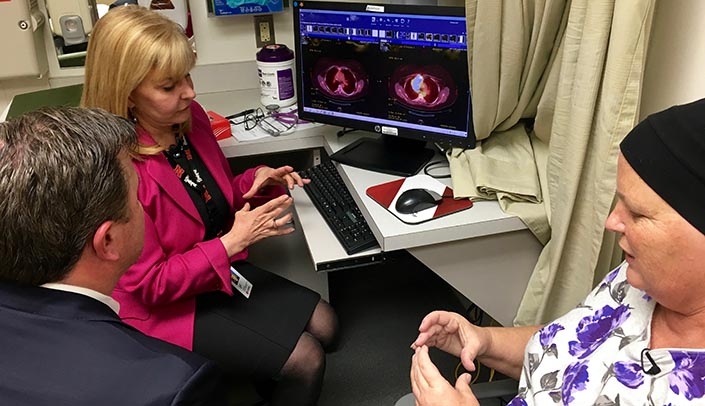It’s the fifth most common type of cancer in U.S. adults. For years, traditional therapies to treat non-Hodgkin lymphoma (NHL) have included chemotherapy, radiation and a stem cell transplant. But after several years of clinical trials, a promising new option has been approved by the U.S. Food and Drug Administration and will soon be commercially offered at Nebraska Medicine.
Real-life impact
Amy Cheese, of Fort Collins, Colo., was out of options before coming to Nebraska Medicine for the clinical trial. The kindergarten teacher had a grapefruit-sized tumor in her chest when she first met Dr. Vose. After receiving CAR T-cell therapy, Cheese is now in remission and back to teaching.
“I can’t stop smiling,” she said. “I am so thankful that I was able to participate in this clinical trial. I think of the people who will not have to hear the words, ‘There is nothing else we can do.’ I am just so thankful.”
“This clinical trial has been unbelievably successful in patient populations where they have failed every other type of treatment, so this is a big home run,” said Julie Vose, M.D., the Neumann M. and Mildred E. Harris Professorial Chair of the Oncology/Hematology Division in the Department of Internal Medicine at UNMC and the chief of hematology/oncology at Nebraska Medicine.
On Oct. 18, the FDA-approved Yescarta, a cell-based gene therapy, used to treat adults with certain types of relapsed B-cell lymphomas. Chimeric Antigen Receptor (CAR T-cell therapy) is a way of taking the patient’s own immune system and modifying it to attack the cancer.
“T cells are white blood cells that help our bodies fight infection and cancer,” Dr. Vose said. “In lymphoma patients, these cells have gone haywire. They don’t fight the cancer properly. This clinical trial has allowed us to take the patient’s own T cells outside the body and restimulate them to be able to fight their own lymphoma.”
Video: FDA approves CAR T-cell therapy
Nebraska Medicine was one of the first hospitals in the Midwest to open the clinical trial, and attracted patients from all over the region. Other health care systems include Memorial Sloan Kettering Cancer Center in New York, University of Washington Medical Center in Seattle, and the Hospital of the University of Pennsylvania in Philadelphia.
“The places that participated in the clinical trials will be the first places to have it commercially available. Eventually, it will spread out to other medical centers,” Dr. Vose said. “Because it’s so specific on how it needs to be given, large transplant centers will be the places that can do this.”
Dr. Vose expects the therapy to be commercially available in December or January. Until then, Nebraska Medicine still has a few clinical trial spots open.
“Clinical trials are very important, especially when it comes to cancer. That’s the way we discover new treatments,” Dr. Vose said. “Everything we have today is because of patients who participated in clinical trials in the past. Without patients on clinical trials, we wouldn’t have any cancer treatments today or tomorrow.”

And the beat goes on! God bless all who are involved in these clinical trials…you can win this battle😎